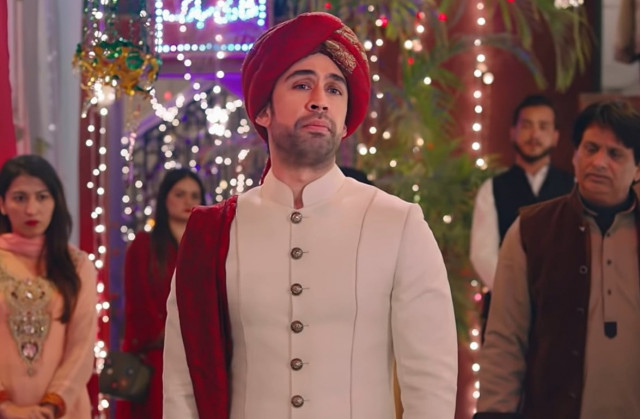‘Parde Mein Rehne Do’ review: A solid story pierced by ill-timed comedy
Wajahat Rauf’s latest offering is far from perfect, but it’s a step in the right direction

To say that Pakistan’s foremost national interests include cricket, marriage and making babies (in that very order) isn’t really a far stretch. In a country where so much of a young person’s life is dictated by the pursuit of the parentally-approved perfect match in order to produce off-spring that will also eventually be fed into the family factory, infertility is no laughing matter. In fact, it isn’t even a matter up for discussion, relegated instead to hushed conversations in private corners or unwarranted expressions of pity towards the couple failing to conceive.
Wajahat Rauf’s Parde Mein Rehne Do uses comedy to usher the topic into the mainstream, keeping it light enough for audiences to comfortably sit through, yet emotionally-charged to the extent that it encourages empathy. Short, sweet and surprisingly effective, the film manages to exceed expectations. This is not to say that PMRD is not a flawed film, with instances of misplaced humour and poor character building fairly obvious on the first watch, but instead that it is a step, no matter how small, in the right direction.
Centered around the emotional and mental struggles of impotency, the Ali Rehman Khan and Hania Aamir-starrer follows the lives of a young married couple, Shaani and Nazo. Having initially tied the knot in secret, the young lovers face mounting pressure to conceive as they repeatedly fail to convey the “good news” of a baby on the way to the in-laws three years into the marriage. Shaani’s parents, played by Javed Sheikh and Munazzah Arif, continue to disapprove of the union, making no attempt to mask their true feelings, with news of the neighbouring couple readying to welcome their ninth child fanning the flames of their discontent even further.
As Shaani and Nazo undergo medical examinations to get to the root of the issue, it is revealed that Shaani cannot have children of his own. What follows is a relatively predictable but satisfying story, ending with the couple leaving the gates of an Edhi orphanage with their arms full and hearts happy.
Clocking in at an hour and a half of runtime, PMRD hits the romantic dramedy sweetspot, providing some much-needed respite from the two and a half to three hour-long cinematic offerings most moviegoers have grown used to owing to big-budget action or drama flicks dominating the box office. The film fills in the vacuum left behind by Bollywood romantic comedies in Pakistani cinemas, providing a viable option for moviegoers who want to enjoy a film without having to sacrifice half their day to the silver screen.
As far as performances are concerned, Ali Rehman Khan and Javed Shaikh take the cake. Ali manages to make the audience feel his distress, using his sensitivity as a tool for an evocative performance, while the latter, with his stubborn nature and selfish attitude, makes the viewer want to fling a shoe at him through the screen as well as laugh at his sense of self-importance, as most manly-men do.
However, when it comes to comedy, the film is pretty hit or miss. Whether it’s using sexual orientation as the butt of outdated and hurtful jokes or adding comedy to scenes that require anything but, several such duds are littered throughout the film, keeping it from reaching its full potential.
There were times during the film, due mainly to the misplaced comedy, that it felt acutely lacking in sensitivity. As Shaani gets the news of his condition, the doctor, in an awkward bid at hilarity, proceeds to berate his patient for being infertile. While the distress is apparent on his face, the doctor continues to hurl insult after insult, provoking laughter out of some cinemagoers, while others sit confused over how this could be considered even remotely funny. Using creative licence to inject humour into an otherwise mundane scene is one thing, having a fertility doctor shame his patient for being biologically unable to concieve is just plain stupid.
On the other hand, the flippant attitude of Shaani’s best friend (Hassan Raza) towards his predicament, often used for comedic effect, helps elevate the story, giving the viewer insight into the sense of isolation experienced by the main character. The otherwise ill-timed jokes work to disrupt the mood of the film, forcing the viewer out of the narrative as they try to get their bearings and figure out what exactly it is that they are supposed to be laughing at.
Nazo’s relationship with Shaani’s parents is another feature of the film that breaks the flow of the story. In their three years of marriage, there is no evolution in the relationship between Nazo and her in-laws, either for better or for worse. The disconnect between the characters damages the narrative, with the filmmakers losing out on the ability to add an extra layer of emotion and a bit more believability to the story.
Nonetheless, despite the film’s pitfalls, PMRD is a fun, light-hearted ride with a message that may actually stick. While a little more work, sensitivity and attention to detail may have gone a long way, it’s heartening to see that the industry appears to have at least started on the journey toward better films.



















COMMENTS
Comments are moderated and generally will be posted if they are on-topic and not abusive.
For more information, please see our Comments FAQ